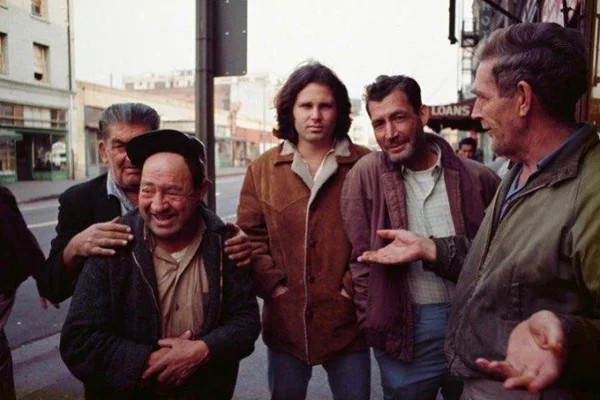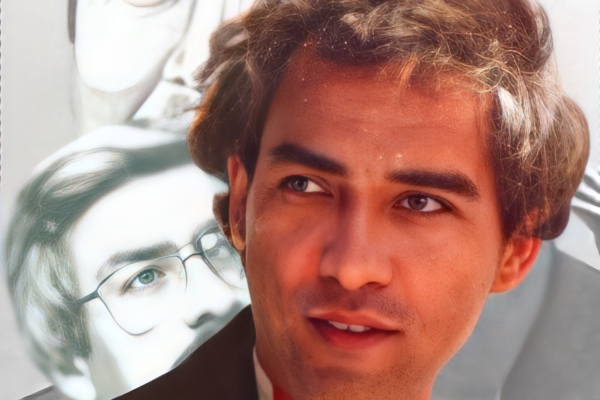Reminiscences in commemorating Día de Los Muertos, a mix of humor and nostalgia celebrating family, tradition and those ever-present connections we share with loved ones beyond this world.
It was a Tuesday, of course. These kinds of things always happen on Tuesdays—mundane, unremarkable days when the universe suddenly decides to unravel in the most peculiar ways. My mom, who had been dead since 2011, called me from heaven. That’s right. Dead for more than a decade, she found a way.

You see, she never wanted an iPhone while she was alive, but now, up there with Steve Jobs himself, she’s finally figured it out. Apparently, he shares more than just cloud storage in the afterlife. And, from what I gather, it wasn’t hard for her to figure out—after all, heaven’s got genius bars too, and if anyone could guilt-trip God into giving her a crash course, it was my mother.
“¡Mijo! Why do you keep thinking that woman sent you to El Salvador to get killed?”
I nearly dropped my phone when I heard her voice.
“You believed she sent you to El Salvador because that was the only way she could kill your column since she hadn’t been able to just do it or to fire you. So she assigned you to El Salvador to get you killed? I didn’t raise you to be this paranoid.”
And there it was, the tone she used when I forgot to bring my books home after school or when I said something dumb in front of a teacher—disappointed, exasperated, and yet, somewhere beneath that, a hint of amused affection. I hadn’t heard her voice in over a decade, but it was unmistakable, piercing through time, space, and whatever divine operating system powered this celestial call.
Before I could respond, she kept going. “She sent you there so you’d finally remember how to speak Spanish! That’s all! She wasn’t trying to kill you. Ay, por Dios! You always think the worst of people.”
“Well, mom,” I stammered, sitting down heavily on the couch, “when they’re killing nuns, priests, archbishops and reporters, it’s not exactly a stretch to think she didn’t want me coming back.”
“Nonsense,” she replied. “No one in heaven thinks about killing anyone. You’re too dramatic, mijo. Even up here, everyone agrees.”
That hit like a soft slap. Dramatic? Me? My mother, bless her soul, had a habit of dismissing my most carefully considered theories as melodrama. It didn’t matter that I had gone to El Salvador at the height of the violence in the 1980s—what mattered was that I’d survived, and to her, that was proof enough that it hadn’t been as bad as I made it sound.
“Oh, and one more thing,” she said, voice tinged with a kind of motherly smugness, “Steve says you should have bought me the iPhone while I was still alive. It’s a wonderful little device.”
I let out a laugh I hadn’t felt coming. “You? An iPhone? You didn’t even want a flip phone!”
“Well,” she huffed, “things change up here. Besides, I needed it to keep up with all the family down there. It’s how I know what you’re up to.”
My mom always had a way of knowing what I was doing, even when she wasn’t supposed to. Growing up, she had this preternatural ability to show up right when I was sneaking in from a night out or to somehow sense when I wasn’t really studying. Now, it seemed, that talent had only improved with time—or perhaps with Steve Jobs’ direct access to the heavenly Wi-Fi.
Still, there was a strange comfort in hearing her voice again, a warmth that filled the cracks left by years of her absence. She was back, for now, and it felt like everything had shifted just a little, as though heaven had rewound a tape I’d thought long erased.
“So, mom,” I said, settling into this surreal conversation, “you and Steve Jobs, huh?”
“Oh yes,” she replied, with a tone as casual as if she were telling me about her latest trip to the Waco Missions Club in my hometown of Waco, Texas. “We became good friends after I got up here. He’s always helping me with my music collection. And you wouldn’t believe it, but he’s quite the dancer.”
“Dancer?” I blinked. “Steve Jobs?”
“Yes! He showed me how to mambo. You know, like when I used to go dancing with your dad on Saturday nights.”
Suddenly, memories of the Missions Club flooded back. Those Saturday night dances—when my parents would leave the house all dressed up, mom in her floral print dress, dad in his suit, their faces lit with a joy that, as a kid, I didn’t fully understand. They danced like it was their lifeline, twirling around the floor to the rhythms of a mariachi band. My mom swore up and down it was a good, Catholic place, “missions” in the title sealing the deal for her. Never mind that the only divine presence was the steady flow of tequila and the cumbia beats that filled the night air.
“So let me get this straight,” I said, grinning now. “Heaven is a nonstop dance party?”
“More or less,” she replied, with a hint of nostalgia in her voice. “Though the music’s better. And no one has bad knees.”
I couldn’t help but laugh again. My mom and Steve Jobs dancing the mambo in heaven. If that wasn’t something to brighten the afterlife, I didn’t know what was.
“But mijo,” she said, her tone softening, “you need to stop carrying all that anger. It’s not good for you. You’ve done well. You’ve made me proud. But you’re still hanging on to things that are long gone.”
There it was—the real message. My mom always had a way of cutting through the nonsense, straight to the heart of things. She could make you laugh, but beneath that, she was serious. She had that Catholic, guilt-laden wisdom wrapped in humor, but when she got down to it, she meant business.
“I know,” I admitted quietly, staring at the floor. “I just… I guess I still feel like I’m proving myself.”
“And to who?” she asked, not unkindly. “To that editor? To those people who doubted you when you were a kid?”
Maybe it was all of them. Maybe it was to myself.
“Mom, you remember how they almost put me in special ed? Because I didn’t speak English yet?”
“I remember,” she said. “And I remember walking into that school, marching right up to the principal’s office, and telling them they had it wrong. You were smart. Gifted. You just needed time.”
She was right, of course. She had been my fiercest advocate, dragging me to the literacy center at Baylor with her, learning English alongside me, even though she hated speaking it. But she never stopped pushing me, never stopped believing in me.
“Look at you now,” she said, her voice lifting with pride. “You’re a writer, and not just in one language. You’ve traveled the world, seen things most people never dream of. And you survived.”
“Barely,” I muttered, thinking of El Salvador, the smell of gunpowder and burning tires still fresh in my mind. But she wasn’t having it.
“No,” she said firmly. “More than barely. You made it. And I don’t want you sitting around thinking someone was trying to kill you. That’s nonsense. You’re alive, mijo, and you’ve got so much more to do.”
Her words hung in the air, a gentle reminder that I wasn’t done yet, not by a long shot.
“Okay, mom,” I said, feeling a warmth I hadn’t felt in a long time. “I’ll stop being so paranoid.”
“You better,” she replied, with a teasing laugh. “Or I’ll have to come down there and knock some sense into you myself.”
And just like that, the connection faded. The line went quiet, the glow of the screen dimming as if it had never happened. But I knew better. She was still there, dancing the mambo with Steve Jobs, watching over me, as she always had.
Maybe heaven really did have iPhones. Or maybe it didn’t matter. Because, in the end, moms always find a way to reach you, one way or another.
TONY CASTRO, the former award-winning Los Angeles columnist and author, is a writer-at-large and the national political writer for LAMonthly.org. He is the author of the forthcoming novel The Book of Marilyn. He can be reached at tony@tonycastro.com.





